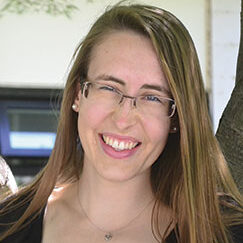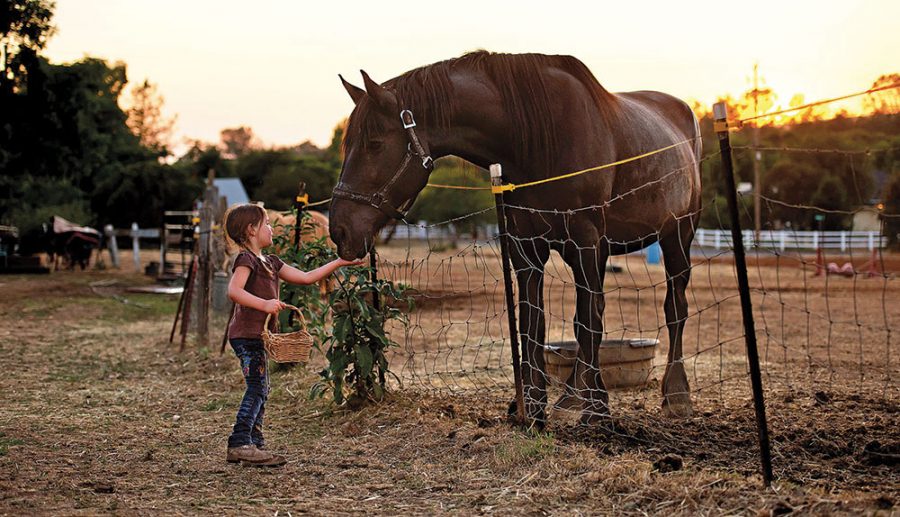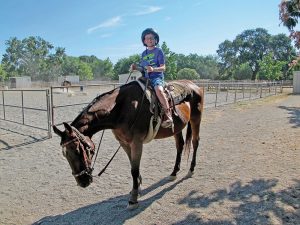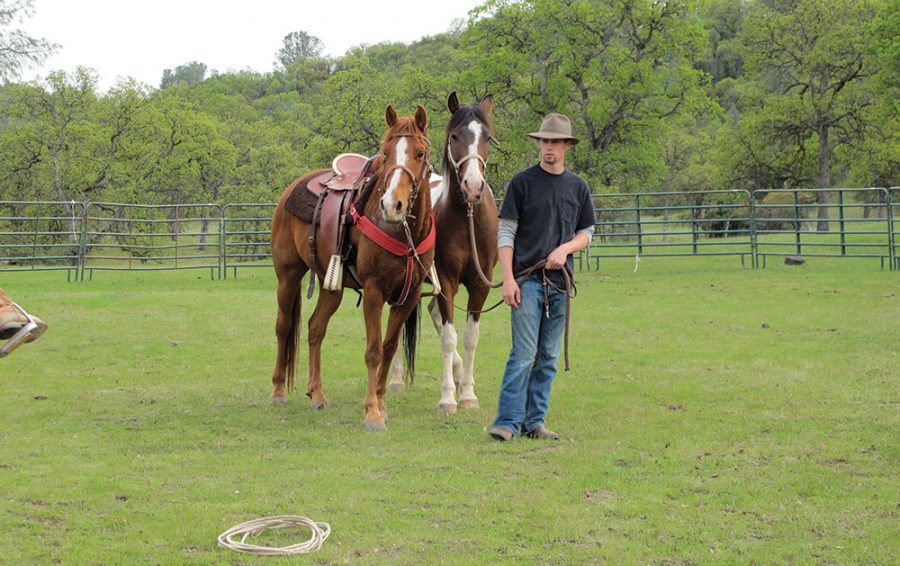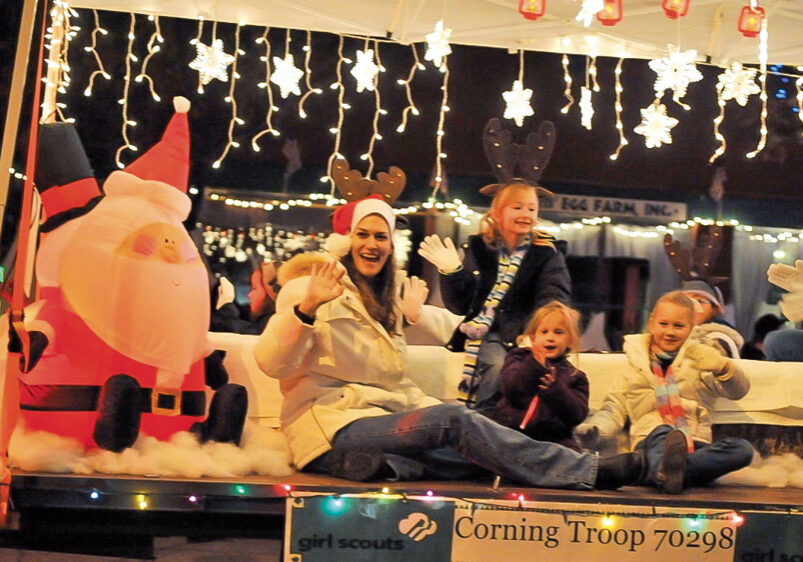Horses In The North State Provide A Multi-Faceted Education For Kids
A meme is floating around the internet featuring an image of two pictures of horses. The first picture depicts an 1800s horse pulling a carriage or wagon. The second image depicts a modern horse riding in a trailer hitched to a truck. The memes usually applaud the horse with a “Well played, horse, well played!”
As these memes humorously point out, although people once greatly depended on horses, technology has lifted most duties from horses in the United States. Today these impressive animals offer more than broad backs and brute strength. North State organizations like Stable Hands, Handi-Riders and California Therapy Horses view horses not as mere vehicles of transportation, but as vehicles to wellbeing for adults and children.
Stable Hands
In Yreka, CA, Stable Hands offers riding instruction and equine-assisted activities to benefit people ages four and up who have cognitive, physical, and emotional disabilities. Marcia Cushman-Perkins, who co-founded Stable Hands about 20 years ago and worked as the nonprofit’s occupational therapist, explains that “horses’ movement is three-dimensional like ours. Unlike a bicycle, for example, a horse moves up and down, side to side, and forward through space all at once. This stimulates the balance centers of the brain.” Balancing astride a horse causes muscles in the back, core, and legs to contract and relax, strengthening the entire body. Straddling a horse requires flexibility, so students with tight muscles due to conditions such as cerebral palsy or brain injury learn to stretch before riding.
Although Stable Hands does not have any counselors or therapists on staff, the instructors create a safe, encouraging environment that fosters emotional growth. Marcia notes that being able to accomplish a task – from grooming a horse to putting on tack, to riding – builds self-esteem. Learning to better communicate with the horse and with other riders helps students gain confidence. As they observe cause-and-effect, students also learn to listen to instruction and follow directions.
Stable Hands creates an excellent environment for kids 14 and older who want to volunteer. Depending on what experience volunteers arrive with, they may begin by laying out equipment for the day or becoming a “sidewalker” who strides alongside riders to encourage them. More experienced volunteers take training to lead the horses for the riders. Marcia notes that Stable Hands has had several students’ siblings volunteer, which can benefit the whole family: “It can be really helpful for students to have that familiar face nearby.”
Handi-Riders
Since 1981, Handi-Riders in Oroville, CA has served clients with and without special needs through private lessons, small group lessons, and seasonal camps. Executive Director Donna Hernandez sees horses enrich the lives of kids as young as three and adults as mature as 90. “Horses are so big, you can’t make them do anything, so you have to create a two-way partnership to get them to cooperate,” Donna explains. Donna says creating this bond requires dedication. Before even getting on, riders spend about 45 minutes grooming, cleaning, brushing and tacking the horses, a process that develops patience, attention to detail, a sense of routine, and awareness of another creature’s needs.
Some students must overcome great fear. Thankfully, Handi-Riders’ miniature horse, Lily, helps put fears to rest. Starting with the 200-pound miniature horse helps students work toward independent-riding on a 1,000-pound full-sized horse.
For kids with sensory issues, something like putting on a riding helmet can cause great distress. But Donna offers practical tips – such as wearing bike helmets at home – to help overcome these obstacles. Donna recalls one child getting only halfway out of the car on her first visit. But, with Donna’s encouragement, the parents’ perseverance, and the friendly horses, those initial fears disappeared. “Now,” says Donna, “she tries to get on the horse before we’re quite ready!”
Once on the horse, riders exercise physical muscles, verbal skills, and confidence. For some with special needs, Donna provides beanbags as extra weight to help strengthen muscles and improve balance. The lessons also emphasize verbal communication with horses, incentivizing even nonverbal riders to learn commands like “Whoa!” and “Walk on.” Regardless of ability, improving in all these tangible skills bolsters the intangible skills of confidence and independence for all riders.
California Therapy Horses
With a motto of “horses healing people,” California Therapy Horses opens the stable doors to people of all ages and abilities, including children who are victims of abuse or who have physical, emotional, or cognitive disabilities. The organization serves as a physical education class vendor for CORE-Butte Charter and offers 50 miles of trail, horseback riding lessons, and summer camps to all children. Families may also lease horses, allowing kids to learn the day-to-day responsibilities of horse ownership.
Shannon Paige, the nonprofit’s CEO, and founder says her horse carried her through a season of deep loss and despair. Subsequently, Shannon began adopting select horses and giving them a new purpose as therapy horses. Once trained, Shannon says, “the horses are the counselors. I’m just a facilitator of the relationships.”
The horse/human relationship can radically impact how kids interact with the world. Shannon describes an emotionally traumatized 13-year-old, so filled with rage that his mother didn’t know where to turn. The boy started working with Reba, an old red mare from the California Therapy Horses herd. After only a few sessions, the boy’s mother called Shannon in tears, saying that on the way home he asked her to stop the car, so he could free a goat caught in a fence. “For the first time in a long time,” the mother said, “my son is experiencing compassion.”
Shannon finds fear or anxiety when interacting with horses often indicates broader fears and anxieties. Learning to address those fears from horseback helps kids develop coping skills they can use anywhere. Shannon offers riders mindfulness and breathing techniques, giving physical responses to use in the face of anxiety. Learning to set boundaries and to take gentle but confident control of a horse also gives kids emotional tools to use in human relationships.
With skill and passion, these three nonprofits strive toward a common purpose: to use horses to help kids and adults in the North State gallop into life with greater physical health, practical skills, compassion, and confidence.
If your kids can’t get enough of horses, saddle up your crew and head out to find others who share the equine love.
 Almond Country Farms, Durham.
Almond Country Farms, Durham.
Horses and ponies are available for riding, private or group lessons throughout the year and seasonal horse camps. (530) 343-1558.
Coffee Creek Ranch, Trinity Center.
Trail rides and horseback riding lessons for ages six and up, and pony rides for kids under five. Kids get discounted rates in the summer. (800) 624-4480.
Exodus Farms, Anderson.
With a special emphasis on foster children, Exodus Farms facilitates opportunities for restoration, freedom, and community for both people and horses who have experienced abuse, loneliness, dependence, or fear. (530) 953-7178.
Triple Creek Ranch, Palo Cedro & Red Bluff.
Family-operated and staffed by volunteers, Triple Creek Ranch connects people with horses through therapeutic classes for people with and without disabilities. Classes encourage family involvement. Overcome fears of horses, learn to care for and ride horses, and visit the wildly popular Christmas event. (530) 527-9394.
Wild Horse Sanctuary, Shingletown.
Trail rides and wild horse viewing year-round. Visit on Saturday, August 18 for the annual open house and benefit, featuring kids’ activities, horse rides, shoeing and saddling demos, and a barbecue for all ages. (530) 474-5770.
Comment Policy: All viewpoints are welcome, but comments should remain relevant. Personal attacks, profanity, and aggressive behavior are not allowed. No spam, advertising, or promoting of products/services. Please, only use your real name and limit the amount of links submitted in your comment.
You Might Also Like...

The Affection Effect in Marriage
Show Your Love! “They must still be dating,” my friend whispered to me. We were standing shivering at my son’s soccer game before the coronavirus swept the nation and we […]
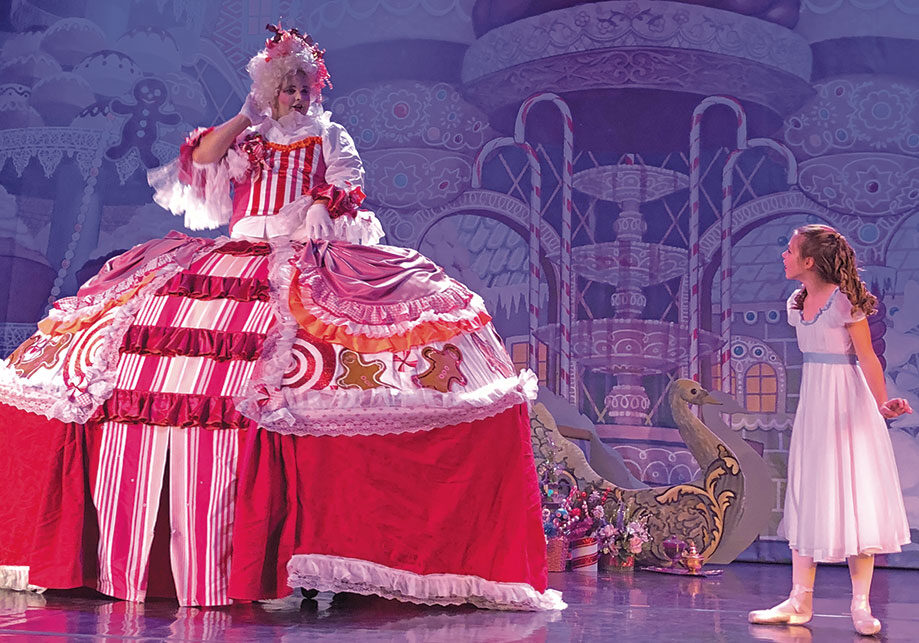
The Redding Ballet Company: The Nutcracker
The Redding Ballet Company is celebrating 20 years of “The Nutcracker” performing three shows and their school show at the Cascade Theater. From its humble beginnings in 1816 as fairy […]

Solar Thermal Water Heating: Efficient and Green
Solar thermal is considered a renewable and green resource for hot water heating. A solar water heating system captures the warmth of the sun, transfers that heat to water, and […]

Helping Kids Cope When an Ailing Grandparent Moves In
A growing number of families with young children are caring for an aging relative. Whether it’s temporary care following surgery, or longer-term care due to a debilitating condition, more and more […]


